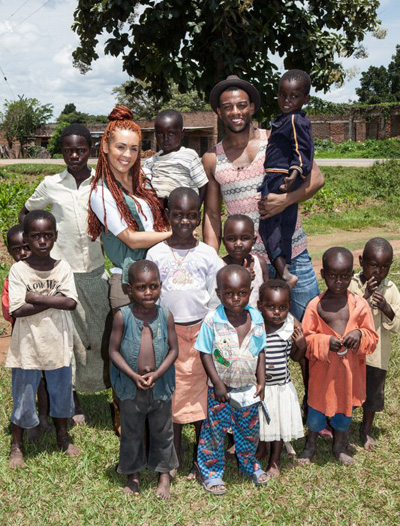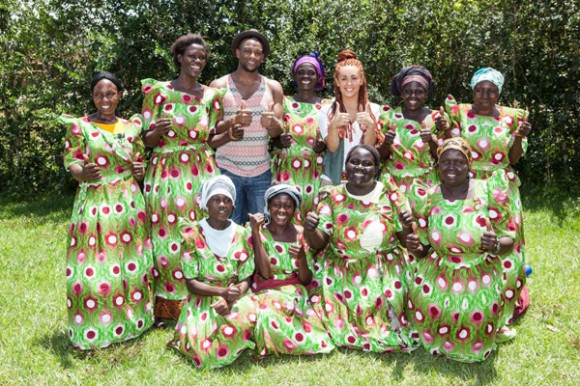During the past few weeks my feet have barely touched the ground, and looking back I can hardly believe everything that has happened. First of all I was ecstatic that all our hard work and training paid off when my boyfriend Oritsè and I won "Stepping Out", ITV's brand new celebrity dance show. But what happened next is just as special to me in an entirely different way. Less than 72 hours after being crowned winners we found ourselves on a plane to Uganda with Comic Relief to see how their Common Ground Initiative is helping communities affected by HIV.
Co-funded by the UK government and Comic Relief, the Common Ground Initiative (CGI) links communities in Africa with diaspora organisations in the UK. The partnerships gives these diaspora organisations the chance to provide ideas, skills and investment based on a first-hand understanding of those communities combined with fresh ideas about ways to tackle the poverty and injustice they face.
I'm a quarter Ghanaian and have always felt a special connection to Africa due to my family roots. Oritse’s family also has African heritage, so visiting the continent for the first time with him meant a lot. Whilst away in Uganda we saw how the initiative was providing HIV care, support and prevention to empower communities, helping them fulfil their potential and break the cycle of poverty.

People living in Sub-Saharan Africa are more heavily affected by HIV and AIDS than anywhere else in the world, with women and children often bearing the brunt of this devastating epidemic. Prompt access to treatment can keep the virus under control and ensure the immune system stays strong so that people receiving HIV treatment can live long, healthy and active lives. But the greater the delay in getting medical intervention, the less effective it may be in preventing the onset of AIDS.
Oritse and I met a woman called Tabisa, who was left heartbroken when her husband Keffa died following an unexplained illness, leaving her to care for their 3 young daughters. The happily married mother faced further devastation after discovering he'd been unfaithful with a woman who'd died from AIDS.
It was the late 90's and a lack of understanding or support meant that many people in Tabisa's rural community were dying from the disease, and those who became ill were often too scared to seek diagnosis or treatment for fear of being ostracised. For the sake of her children, Tabisa took the brave decision to get tested and after discovering she too had contracted the HIV virus she began receiving treatment.
Surrounded by others in desperate need of help, Tabisa was one of a group of local widows who set up the Kadama Widows Association in 2002. Their aim was to enable people living with HIV to enjoy longer, healthier lives, and to provide assistance to women and children who'd lost loved ones to the disease.

Since then the project has grown into a flourishing network of support groups and care services. Playing a crucial role in this success has been Mary Mosinghi, a Ugandan teacher now living in the UK who told us she felt compelled to do something after learning of the suffering that HIV and AIDS-related deaths were causing in her home community.
Oritsé and I heard from Mary about how backing from the Common Ground Initiative has enabled her to use her close personal links to Uganda and in-depth understanding of the issues facing communities there to support Kadama Widows and ensure the project staff at the grassroots are getting the right skills and resources to achieve long term, sustainable change where it is needed most.
Tabisa is just one of the project's many success stories, demonstrating what people can achieve with the right emotional and practical support. Now 47, she has trained as one of the project’s Home Based Care Nurses, visiting people where they live to provide a range of services, including counselling, first aid treatment, nutritional information and assistance with income generating activities. She also helps save lives by encouraging others to seek early testing and treatment - sharing her own story to reduce stigma and illustrate that with proper management HIV doesn’t have to be a killer.
It's been amazing to meet inspirational women like Tabisa and Mary, and to witness how their dedicated hard work is radically improving things for an entire community. What's more, it's great that Oritsé and I are in a privileged position to let the British public know how their generous support for Comic Relief and the UK government is playing a pivotal part in enabling people who are living with HIV to lead happy, fulfilling lives.
The Common Ground Initiative, co-funded by Comic Relief and the UK government, is empowering disadvantaged communities across Africa, helping them fulfill their potential and break the cycle of poverty. To find out more, visit facebook.com/ukdfid or comicrelief.com
------------------------------------------------------------------------------
Please note, this is a guest blog. Views expressed here do not necessarily represent the views of DFID or have the support of the British government.

Recent Comments